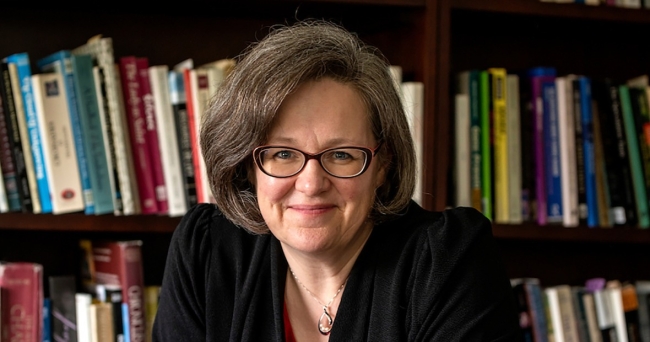You have /5 articles left.
Sign up for a free account or log in.

Anne Harris, president of Grinnell College
Grinnell College
Grinnell College announced Tuesday that it will eliminate loans -- and replace them with grants -- for all need-based financial aid packages going forward.
The private liberal arts college in Iowa said it acted "in response to the financial hardship that many families are experiencing because of the pandemic." But Grinnell will keep the policy in place after the pandemic ends.
The policy means that aid packages will no longer include any loans to meet a student's full need.
Only a handful of liberal arts colleges and another handful of research universities have similar policies. But they enacted them before the current pandemic, which has stressed college and university budgets across the country.
Grinnell has an endowment worth about $2 billion, which makes it possible to afford such a move. The elimination of loans will cost the college $5 million this year on top of $10 million the college is spending on COVID-19-related help for students. The college currently budgets $53.7 million per year for student aid.
As many as 1,050 students will benefit, according to Grinnell estimates. That's about half of the student body.
According to the U.S. Department of Education's College Scorecard, the average student loan debt of graduates is between $11,700 and $16,980, depending on their major.
"We are engaging in this initiative because we believe that education benefits not just individuals but communities and, in that benefit, is a crucial engine of democracy," said Anne Harris, president of Grinnell. "Grinnell is deeply committed to preserving access to the transformative experience of a liberal arts education."
As for keeping the policy of not requiring any loans to enroll, Harris said the economic recovery from the pandemic is likely to be long term. "Our policy should be long term," she said.
Grinnell is also among roughly 45 colleges that are need blind in admissions, meaning they admit students without considering how much financial support they will need to enroll.
In 2012, Grinnell announced that it might move away from need-blind admissions, citing the high cost of the policy. The announcement caused considerable concern at Grinnell and among liberal arts colleges generally because of the college's wealth. If Grinnell couldn't afford it, who could? In 2015, the college announced that it would keep need-blind admissions.
Harris, who was not at Grinnell at that time, said the discussions led to more alumni giving and that the college is committed to its financial aid policies.
There was no need to adopt a no-loans policy to compete for more applications. Nationally, applications are in decline, with the Common Application reporting an 8 percent drop so far this year. Applications for first-generation students and those eligible for fee waivers are down 16 percent.
But Grinnell is doing well on applications. It just passed its first of two deadlines for early decision, reporting a 19.4 percent increase in applications over last year.
Even at a college like Grinnell, where half the student body doesn't need aid, such moves make a difference.
One of the other colleges that has a no-loans approach is Davidson College, which adopted it prior to the pandemic. But in April, Davidson announced that it would let all students except seniors defer paying their bills, sent out in July, until August of 2021. Seniors graduating next spring can defer the fall semester bill until April 1 of next year.
The offer was used by 347 students.








